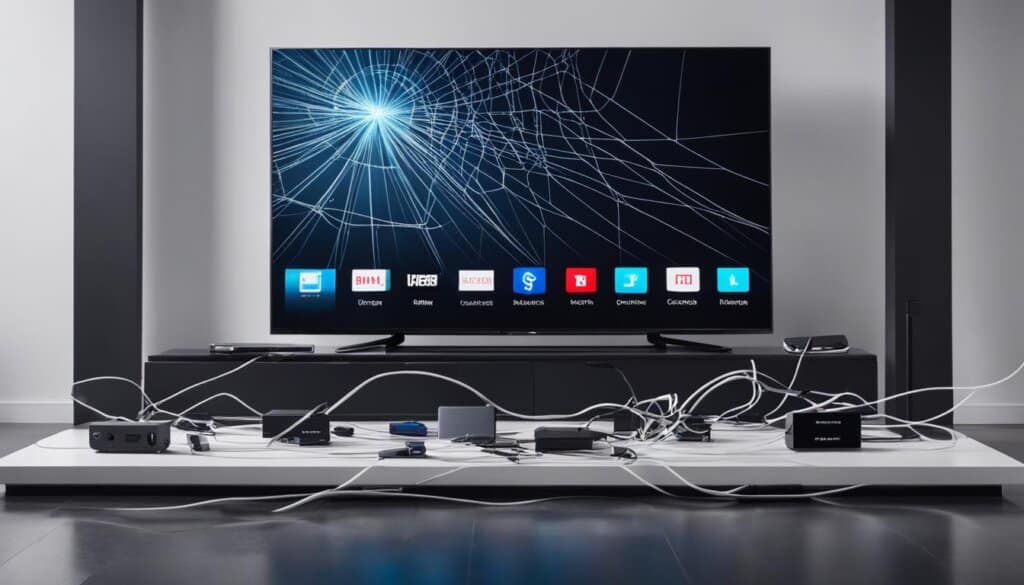Table of Contents
Smart TV technology has revolutionised the way we experience home entertainment. These televisions offer intuitive features and seamless connectivity, making them the perfect choice for a comprehensive entertainment solution. With powerful processors, internet connectivity, and user-friendly software, smart TVs are similar to smartphones or tablets, providing users with access to a wide range of apps, video streaming services, games, social media platforms, and the ability to control other connected devices in their homes.
Smart TVs have come a long way, offering advanced capabilities that enhance the viewing experience. Whether you want to stream your favorite shows, indulge in gaming, or browse social media, a smart TV provides it all in one device. Its intuitive features and seamless connectivity make it a must-have for anyone seeking a superior home entertainment experience.
What is a Smart TV?
A smart TV is an internet-enabled television that offers a range of features beyond traditional TV viewing. These TVs have built-in Wi-Fi or Ethernet connectivity, allowing users to access streaming services and download various apps. With a smart TV, users can stream videos from popular platforms like Netflix, Hulu, and Amazon Prime Video, play games, check social media, and control smart home devices. The smart TV functions like a smartphone or tablet, providing users with a wide range of entertainment options and internet connectivity.
Smart TVs have transformed the way we experience home entertainment. Their internet connectivity enables seamless access to a vast array of streaming services and apps, turning the television into a comprehensive entertainment hub. Users can enjoy their favorite movies, TV shows, sports events, and music concerts with just a few clicks. The convenience of streaming services eliminates the need for traditional cable or satellite subscriptions, giving users the freedom to choose what they want to watch, when they want to watch it.
In addition to streaming services, smart TVs offer a wide range of entertainment options. Users can play interactive games, browse social media platforms, and even control their smart home devices using the TV’s interface. Whether it’s catching up on the latest episodes of a favorite show, playing multiplayer games with friends, or getting real-time updates from social media, a smart TV provides endless possibilities for entertainment.
The user-friendly interface of smart TVs makes it easy to navigate and discover new content. With intuitive menus and customizable layouts, users can personalize their viewing experience and access their favorite apps and services with ease. Many smart TVs also support voice commands, allowing users to control their TV and search for content using simple voice prompts. This hands-free experience enhances convenience and accessibility, making smart TVs a popular choice for tech-savvy users.
From movie nights to gaming sessions, a smart TV offers a comprehensive entertainment solution with its internet connectivity, wide range of streaming services, versatile apps, and seamless integration with other smart devices. It has become an essential part of many households, elevating the home entertainment experience to a whole new level.
Which companies make smart TVs?
Leading TV manufacturers have embraced smart TV technology, offering a wide range of models to suit different consumer preferences. Some of the prominent smart TV manufacturers include Hisense, LG, Panasonic, Philips, Samsung, Sharp, Sony, TCL, Toshiba, and Vizio. Each manufacturer has its own smart platform, which varies in terms of performance, app availability, and user experience.
Consumers should be cautious when considering budget-priced TVs from lesser-known brands, as they may have limited app selection and lower performance compared to established manufacturers.
Comparison of Smart TV Manufacturers
| Manufacturer | Smart Platform | Performance | App Availability | User Experience |
|---|---|---|---|---|
| Hisense | Vidaa U | Decent | Good | Intuitive |
| LG | webOS | Excellent | Extensive | User-friendly |
| Panasonic | My Home Screen | Good | Varied | Customizable |
| Philips | SAPHI | Decent | Limited | Straightforward |
| Samsung | Tizen | Excellent | Extensive | Smooth |
| Sharp | Aquos Net+ | Good | Varied | Simple |
| Sony | Android TV | Excellent | Extensive | Feature-rich |
| TCL | Roku TV | Good | Wide Range | User-friendly |
| Toshiba | Vidaa U | Decent | Good | Intuitive |
| Vizio | SmartCast | Good | Varied | User-friendly |
As seen in the above comparison table, different manufacturers offer varying performance, app availability, and user experience. It is important for consumers to consider these factors when choosing a smart TV that fits their needs and preferences.
When investing in a smart TV, opting for a reputable manufacturer can provide assurance of quality, reliability, and continued support for software updates and app compatibility.
How do smart TVs connect to the internet?
Smart TVs offer multiple options for internet connectivity, allowing users to enjoy a wide range of online content. The most common methods of connecting a smart TV to the internet include wired Ethernet and Wi-Fi.
Smart TVs are equipped with built-in Wi-Fi capabilities, enabling them to connect to your home network wirelessly. This allows for convenient setup and eliminates the need for additional cables. Most modern smart TVs support the latest Wi-Fi standard, 802.11ac, which offers faster and more reliable wireless connections. However, older models may still use the 802.11n standard, which provides slightly slower speeds.
For optimal performance and stability, it is recommended to position your Wi-Fi router close to your smart TV. This will ensure a strong Wi-Fi signal and minimize any potential interference. If your router is far from your TV or the Wi-Fi signal is weak, you may experience buffering or lag while streaming content. In such cases, consider using a wired Ethernet connection instead.
A wired Ethernet connection involves connecting your smart TV directly to your router using an Ethernet cable. This method typically provides faster and more stable internet connectivity compared to Wi-Fi. It is especially beneficial if you have a high-speed internet connection or frequently stream high-resolution content.
Additionally, if you have a large home or face Wi-Fi coverage issues, you can use Wi-Fi range extenders or mesh routers to enhance your Wi-Fi signal. Wi-Fi range extenders amplify and expand the wireless signal, while mesh routers create a network of multiple devices to provide seamless coverage throughout your home. These devices can be placed strategically to eliminate dead spots and ensure a strong and stable Wi-Fi connection for your smart TV.
Advantages of Wi-Fi and Wired Ethernet
Both Wi-Fi and wired Ethernet have their advantages when it comes to connecting your smart TV to the internet.
| Wi-Fi | Wired Ethernet |
|---|---|
|
|

What Services Do Smart TVs Offer, and How Do They Differ from One Another?
Smart TVs provide a diverse range of services and content options that enhance the overall viewing experience. These televisions are equipped with interactive features and internet connectivity, allowing users to access a wide variety of entertainment options directly on their TV screens. Let’s explore the different services offered by smart TVs and how they differentiate themselves from one another.
1. Streaming Services
One of the key offerings of smart TVs is access to various streaming services. Users can enjoy their favorite movies, TV shows, and documentaries through popular platforms such as Netflix, Amazon Prime Video, and Disney Plus. These streaming services provide a vast library of content, giving users the ability to choose from a wide range of genres and categories.
2. Video Sharing Sites
In addition to streaming services, smart TVs also feature built-in apps for video sharing sites like YouTube. This allows users to browse and watch a multitude of videos conveniently on their TV screens. From music videos and vlogs to tutorials and funny clips, the possibilities are endless when it comes to video content on smart TVs.
3. Social Media
Many smart TVs support social media apps, such as Twitter and Facebook, providing users with the ability to stay connected and engaged with their online communities. However, it’s important to keep in mind that the user experience may vary depending on the TV platform and app compatibility.
4. Voice Assistants
As technology advances, voice assistants have become a common feature in smart TVs. Popular voice assistants like Amazon Alexa and Google Assistant allow users to control their smart TVs and search for content using simple voice commands. This hands-free experience enhances convenience and makes navigating through the TV’s features even easier.
5. Smart Home Integration
Smart TVs are increasingly integrating with smart home devices, enabling users to control various connected devices from their TV screens. Whether it’s adjusting the lighting, controlling the thermostat, or monitoring security cameras, smart TVs act as a central hub for managing all smart home functionalities.
“Smart TVs provide a comprehensive home entertainment experience by offering access to popular streaming services, video sharing sites, social media, voice assistants, and seamless integration with smart home devices.”
Overall, smart TVs cater to a wide range of entertainment needs, providing users with a centralized platform to access various services and control connected devices. Whether it’s streaming the latest movies, watching viral videos, or managing smart home functionalities, smart TVs offer a convenient and immersive entertainment experience.
Can a smart TV receive software updates?
Just like any other operating system, smart TV software receives periodic updates from manufacturers. These updates can add new features, improve existing functionalities, and address security vulnerabilities. Major TV manufacturers regularly release software updates for their smart TVs, ensuring that users have access to the latest features and bug fixes.
However, the frequency and availability of updates may vary between brands and models. Smaller or older TV brands may be slower in providing updates, and some budget-friendly options might offer limited app compatibility. Nevertheless, most manufacturers strive to keep their smart TVs up to date and compatible with popular services and apps.
Table: Comparison of Software Update Availability by Smart TV Manufacturers
| Manufacturer | Software Update Frequency | New Features and Bug Fixes | App Compatibility |
|---|---|---|---|
| Hisense | Regular | Yes | Good |
| LG | Frequent | Yes | Excellent |
| Panasonic | Occasional | Yes | Good |
| Philips | Regular | Yes | Good |
| Samsung | Frequent | Yes | Excellent |
| Sharp | Occasional | Yes | Good |
| Sony | Regular | Yes | Excellent |
| TCL | Occasional | Yes | Good |
| Toshiba | Regular | Yes | Good |
| Vizio | Frequent | Yes | Excellent |
As depicted in the table above, major manufacturers such as LG, Samsung, and Sony have a frequent and regular update cycle for their smart TVs. These updates not only provide new features but also ensure excellent app compatibility. On the other hand, smaller or lesser-known brands like Panasonic and TCL may release updates less frequently and have limited app compatibility.
It is important for users to keep their smart TVs updated to enjoy the latest features, bug fixes, and security patches. Ensuring app compatibility ensures a seamless experience and access to a wide range of apps and services.
Can a Smart TV Crash or Hang Like a PC?
Smart TVs have come a long way in terms of performance and stability, thanks to advancements in hardware and software. While they are designed to offer advanced functionality, there is still a possibility of encountering performance issues, such as crashes or laggy performance.
If you ever find yourself facing a frozen screen or a hanging process on your smart TV, there are troubleshooting steps you can take. One common solution is power cycling the TV by turning it off and on again. This simple action often resolves the issue and restores the TV to normal operation.
It’s important to note that lower-end smart TVs or older models with outdated hardware may be more prone to performance issues. If you’re experiencing frequent crashes or persistent lag, it might be worth considering upgrading to a newer model with improved specifications. Upgrading to a smart TV with better processing power and more memory can significantly enhance your viewing experience and minimize the chances of encountering performance hiccups.
Overall, smart TVs are designed to offer a stable and reliable viewing experience. However, as with any electronic device, occasional troubleshooting may be necessary to address any performance issues that may arise.
FAQ
What is smart TV technology?
Smart TV technology refers to internet-enabled televisions that offer advanced features beyond traditional TV viewing. These TVs are equipped with powerful processors, internet connectivity, and user-friendly software, providing users with seamless access to apps, streaming services, games, social media, and control over other connected devices in their homes.
What is a smart TV?
A smart TV is an internet-enabled television that allows users to access streaming services, download various apps, play games, check social media, and control smart home devices. These TVs function similarly to smartphones or tablets, offering a wide range of entertainment options and internet connectivity.
Which companies make smart TVs?
Some of the prominent companies that produce smart TVs include Hisense, LG, Panasonic, Philips, Samsung, Sharp, Sony, TCL, Toshiba, and Vizio. Each manufacturer has its own smart platform, which may vary in terms of performance, app availability, and user experience.
How do smart TVs connect to the internet?
Smart TVs can connect to the internet using either a wired Ethernet connection or built-in Wi-Fi. Most modern smart TVs support 802.11ac Wi-Fi, while older models may still use the 802.11n standard. It is recommended to position the router close to the TV or use a wired connection for optimal performance. Wi-Fi range extenders or mesh routers can also be used to ensure a strong and stable connection, especially in larger spaces.
What services do smart TVs offer, and how do they differ from one another?
Smart TVs offer a wide range of services and content choices, including popular streaming services like Netflix, Amazon Prime Video, and Disney Plus. They also have built-in apps for video sharing sites like YouTube and support for social media platforms like Twitter and Facebook. Some smart TVs feature voice assistants like Amazon Alexa and Google Assistant, allowing users to control the TV and search for content using voice commands. Moreover, smart TVs are increasingly integrating with smart home devices, enabling users to control various connected devices from their TVs.
Can a smart TV receive software updates?
Yes, like any other operating system, smart TV software receives periodic updates from manufacturers. These updates can add new features, improve existing functionalities, and address security vulnerabilities. Major TV manufacturers regularly release software updates for their smart TVs to ensure users have access to the latest features and bug fixes. However, the frequency and availability of updates may vary between brands and models.
Can a smart TV crash or hang like a PC?
While smart TVs have become more advanced and stable, there is still a possibility of performance issues such as crashes or laggy performance. In such cases, users can try power cycling the TV by turning it off and on again, which often resolves the issue. It is worth noting that lower-end smart TVs or older models with outdated hardware may be more prone to performance issues. However, most smart TVs offer a stable and reliable viewing experience.







